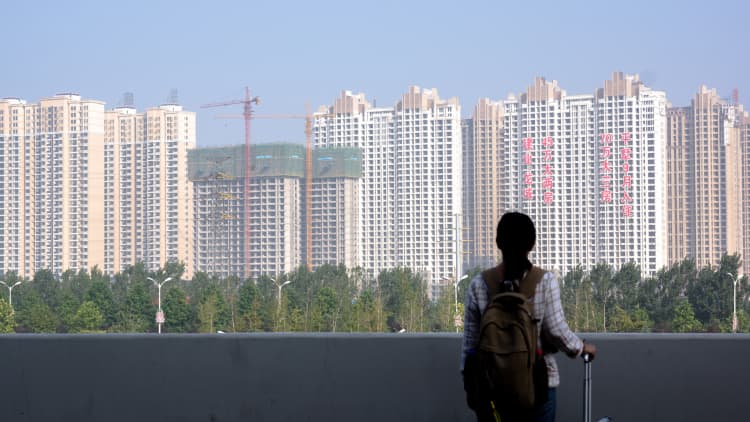Chinese authorities are seeking to crack down on a surge of unregulated lending that is pushing up property prices in the country's biggest cities, before it wreaks damage to the wider economy.
In comments at the weekend Zhou Xiaochuan, head of the People's Bank of China, denounced loans for down payments on homes as illegal. Pan Gongsheng, a central bank vice-president, said regulators will act against the peer-to-peer companies that grant such loans.
But many experts are worried that property speculation in China's four biggest cities has reached new highs, largely due to such shadow financing. Unregulated funds have ploughed billions of renminbi into the property market in recent months.
"I have been very nervous about this because it reminds me of the US subprime crisis," said Xia Le, chief economist for Asia at BBVA. "In the past, people buying houses paid using their own money but now they're using speculative shadow finance."
Home sales in Beijing, Shanghai, Guangzhou and Shenzhen, China's "first-tier" cities, grew 14 per cent last year compared with about 7 per cent nationwide. In Shenzhen, the average price per square meter in February increased by about 50 per cent compared with a year earlier, according to Soufun, a real estate consultancy.
More from the Financial Times :
Goldman buys pensions robo-adviser
The unravelling of Angela Merkel's power
China mall serves up Hong Kong shopping experience
The divergence between the first-tier market and the rest of China was partially caused by shadow funds pouring into the market, Bank of America Merrill Lynch said in a note.
The property boom in the four big cities also comes despite a series of targeted government measures. In the wake of the collapse of the US housing market in 2008, China launched restrictions on mortgages to rein in the country's then red hot property market, which was part-fuelled by speculation on borrowed money.

By forcing buyers to put up a 30 per cent down payment for their first homes and as much as 50 per cent for their second or third, the government gradually brought the overheating market to heel.
But the peer-to-peer companies — loosely regulated financiers that match cash from investors with borrowers online — have helped buyers circumvent such controls. About 15 large peer-to-peer money lenders with products concentrated in Shenzhen, Beijing and Shanghai have granted unsecured loans that allow customers to pay deposits, freeing them up to apply for mortgages at banks, and so tying the formal banking system into the speculative wave.
"It's attracting a lot of lower-quality borrowers and of course people who want to speculate on real estate," said Roger Ying, chief executive of Beijing-based P2P platform Pandai.cn, which does not offer down payment loans.
Estimates from WDZJ.com, a P2P consulting company, put the total amount of P2P cash that has seeped into the system at Rmb5bn ($770m), a fraction of the total property market.
However, Lianjia.com, a Beijing-based real estate company and P2P lender shut down last week, has lent up to Rmb3bn alone, according to state-backed Chinese media, suggesting the real figure could be much higher.
The Rmb 5bn figure also omits mortgages that borrowers have received from banks after using P2P funds for down payments. State media estimate that up to a third of Shenzhen's real estate market, with mortgages worth more than Rmb1tn in December, is speculative in nature, with houses bought as investments rather than residences.
China's biggest cities only comprise 5-9 per cent of the country's overall property market, but some analysts underline concern at the impact of the property boom on the economy as a whole.
Spark Wang at Wolters Kluwer Financial Services in Shanghai said the P2P loans were riskier than some of the products issued during the US subprime crisis, especially given their high cost and short duration.
P2P loans typically mature in 90 days and carry hefty interest rates of up to 12 per cent.
"The real pressure on the borrowers' future cash flow is underestimated," Mr Wang said. If speculators were using the down payment loans to apply for multiple mortgages from banks, he added, "then the systemic risk to the banks are potentially very high".



